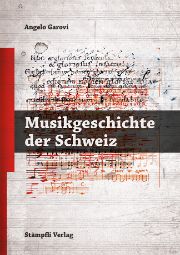A new history of Swiss music
In his book, Angelo Garovi looks at music in what is now Switzerland from late antiquity to the present day.

Who composed the symphony for 156 office machines at the 1964 Expo? What compositions did Igor Stravinsky write on Lake Geneva? Were there only women composers in monasteries? And what is so special about Arthur Honegger's music?
When Antoine-Elisée Cherbuliez, Professor of Musicology at the University of Zurich, wrote the first history of Swiss music in 1932, Arthur Honegger was still one of the "young" composers. Since then, there has been no independent publication on Swiss music history. Angelo Garovi now examines musical themes on Swiss territory in numerous brief chapters. He begins with the late Roman water organ at Avenches, addresses the music at the great monasteries of St. Gallen and Engelberg and at the Council of Basel, talks about liturgical games in the late Middle Ages and festival culture in the 19th and 20th centuries, about minnesong and cowbells, the Geneva Psalter and Glareans Dodecachordon. Switzerland also plays a role as a host and inspirational country for famous musicians from neighboring countries.
Angelo Garovi (*1944 in Sarnen) studied German philology, history, music history and organ as well as composition with Mauricio Kagel. Garovi was a music critic in Lucerne, music editor at Swiss Radio SRF in Bern, state archivist for the canton of Obwalden and professor of German philology at the University of Basel. He has lectured at various universities in Switzerland and abroad.
Angelo Garovi, Musikgeschichte der Schweiz, with index of composers' names, 160 pages, illustrated, paperback, Fr. 19.90, Stämpfli, Bern 2015, ISBN 978-3-7272-1448-6









